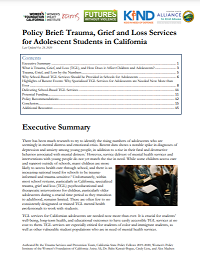A Q&A with the National Fund for Workforce Solutions and FUTURES
October is Domestic Violence Awareness Month. At the Workplace Resource Center on Domestic and Sexual Violence, we know the toll economic abuse and workplace sabotage take on survivors and their workplaces. However, the intersection between domestic violence and workforce development is rarely discussed.
We sat down with Michelle Rafferty, chief program officer at the National Fund for Workforce Solutions (pictured left) and Sarah Gonzalez, associate director for workplace and economic justice at FUTURES WITHOUT VIOLENCE to discuss how domestic violence shows up at work and how workforce development can better support survivors.
Some advocates see a disconnect between the workforce development community and the gender-based violence prevention community. Does this disconnect exist?
Rafferty: I’ve held positions in both fields and have witnessed the disconnect first-hand. Workforce organizations may make cross-referrals for survivors who are searching for a job, but we could have a much greater impact on economic outcomes for survivors of gender-based violence if we developed strategies for systemic change.
It can be challenging to connect the dots across the complex systems of human service, policy, government and advocacy organizations at local, state and federal levels. We have so much to do with limited resources – and also have to work hard to stay on top of key issues and changes in our respective fields. It’s not surprising that this results in silos.
In addition, our country still underestimates how common gender-based violence is. As a result, workforce development groups don’t always have access to resources or training to screen for violence and intervene in helpful ways. And it’s incredibly challenging and sometimes unsafe for someone to disclose they are dealing with an abusive partner.
This all results in not enough survivors being connected with the support they need to build careers, while their partners often undermine or sabotage their economic independence.
Just imagine what we could do to close gender gaps in employment, income, and wealth if we created local systems that intentionally supported the physical, emotional and economic well-being of survivors.
This Q&A tackles the intersections of workforce development and gender-based violence. How do you define the term “gender-based violence”? Why is it important to define?
Gonzalez: Gender-based violence is a broad spectrum of abusive behavior and/or harassment directed toward a person based on their gender. It’s about power and control over another. It encompasses domestic, dating or intimate partner violence, sexual assault, stalking, and human trafficking. The abuse spans physical, sexual, and psychological harm; threats and coercion; being denied one’s basic freedoms; and economic sabotage and control.
There are many terms used to describe this kind of violence, including domestic violence and intimate partner violence. On a technical level, these terms may have different definitions, especially within research. But we use the term “gender-based violence” to recognize that this type of violence impacts everyone: those who identify as heterosexual, LGBTQIA+, cis-gender women and men, or who are gender-non-conforming or transgender. While data show men are primarily the perpetrators, women, gender-non-conforming individuals, and transgender individuals can use gender-based violence as well.
Gender-based violence is too often narrowly viewed as physical violence or rape, and something that only impacts certain identities. But that’s not true. By recognizing what gender-based violence is at its core and what it can look like, workplaces and workforce development providers are better able to prevent it and support those who experience it.
How does gender-based violence affect survivors in the workplace? And why is understanding its impact on workers and the workplace important for employers?
Gonzalez: Aside from sexual harassment, gender-based violence is generally not seen as a workplace issue. But it is. Violence doesn’t stay home. There are people in your workplace right now who have or are currently experiencing gender-based violence and harassment.
At the most extreme, women are getting killed at work. One in three female workplace homicides were committed by a personal relation, most of whom were intimate partners.
Abusive actions not only affect those who are targeted, but everyone in the workplace. Abusive partners often make harassing phone calls, show up at work, keep survivors up all night, or assault them before work so they struggle to perform their job duties. This, of course, also affects co-workers who witness abuse.
It also affects workplace safety in other ways. In a survey, nearly 20 percent of perpetrators of violence against their intimate partners reported causing or almost causing a serious accident at work because they were distracted.
And it’s also taking an economic toll: seven out of 10 survivors say their abusive partners stopped them from working. The goal of employment sabotage is to limit the resources and opportunities survivors have to seek safety and independence. Unfortunately, all too often, survivors are also penalized by employers, making them more vulnerable to harm. About 60 percent of victims report losing their jobs because of the impacts of violence and abuse.
One of the core missions of the National Fund for Workforce Solutions is advancing equity and a human-centered workplace. How does advancing trauma-informed workplaces and supporting survivors advance this mission?
Rafferty: The National Fund aims to advance workforce equity by ensuring all workers have resources required to thrive in careers, all jobs are good jobs, and race does not dictate employment outcomes. We believe that job quality and equity cannot exist without the other. All workers need access to a job that is safe, offers sustainable pay and benefits, is secure and stable, and provides career pathways and opportunities for mobility. We outline these principles in our Job Design Framework.
Centering worker voice is key to creating quality jobs and equitable workplaces. Businesses that are able to retain a skilled and committed workforce and achieve their goals often prioritize the well-being and engagement of their staff. They recognize that workers bring their whole selves to the workplace, and sometimes that means they show up with the mental and physical impacts of toxic stress, abuse, or trauma. Ignoring this can cause harm to both the worker and the business.
You can learn about practices that employers can adopt to create more supportive workplaces in the National Fund’s guide, A Trauma Informed Approach to Workforce.
What are some best practices for a trauma-informed workplace?
Gonzalez: First, a trauma-informed workplace recognizes that its employees have lived experiences that may include trauma, whether related to gender-based violence, racism, a near-death experience, or other life events. Knowing that, employers should respond with supportive policies and practices that seek to create a space in which all workers can thrive and do their best work.
Trauma-informed environments center on six principles: safety; transparency and trust; peer support; collaboration and mutuality; empowerment, voice, and choice; and cultural, historical, and gender issues. Each of these principles reinforce one another to create a stronger and more trauma-informed workplace.
So what can this look like?
Employers can start staff meetings by checking in on how employees are doing, which centers their humanity and helps establish a psychologically safe environment. They can be clear about workplace policies and decision-making processes, share the rationale behind them, and implement them equitably and consistently. And they can foster connection and belonging through team building or meeting rituals to help increase feelings of safety, inclusion, respect.
These are just a few examples. There are so many actions both individuals and organizations can take. At the FUTURES National Resource Center on Domestic and Sexual Violence, we offer a range of technical assistance and training resource to support employers in these efforts.
It sounds like the changes needed within the workforce development community go beyond the individual organization level, to create new norms around gender-based violence in the workplace. What does systems-level change look like and why is it critical?
Rafferty: Systems-level change can be driven by legislative or administrative policies, through sustained commitments and alignment between key community institutions and organizations, through new narratives and shared beliefs, and through other mechanisms.
To better support the economic outcomes of survivors, workforce development systems should dedicate more resources to understanding and responding to the impact of gender-based violence on workers. It should be something we try to solve, as much as lack of access to affordable, quality child care or safe, affordable transportation. And we need leaders to acknowledge and prioritize these issues, to begin to change the narrative that gender-based violence is uncommon or that a survivor can simply choose to not be abused.
These are a few basic preliminary suggestions. Developing a more comprehensive recommendation would require much more thought, analysis and partnership.
Let’s keep this conversation going! I’m looking forward to comments and ideas from our readers.
Michelle Rafferty
As chief program officer on the executive team at the National Fund, Rafferty articulates and implements the organization’s strategic vision and oversees its program portfolio. Rafferty has spent her career working to reduce unemployment and poverty while promoting racial, socio-economic equity.
Sarah Gonzalez
is associate director, workplace and economic justice at FUTURES WITHOUT VIOLENCE. She leads initiatives relating to economic justice and security, and safety and gender equity in the workplace, and works to improve access to quality employment opportunities for survivors of trafficking and gender-based violence.


 Trauma, grief, and loss (TGL) services for Californian adolescents are needed now more than ever. It is crucial for students’ well-being, long-term health, and educational outcomes to have easily accessible TGL services at no cost to them. TGL services are especially critical for students of color and immigrant students, as well as other vulnerable student populations who are in need of mental health services. This brief highlights the critical need for TGL services for Californian children and youth, especially adolescents.
Trauma, grief, and loss (TGL) services for Californian adolescents are needed now more than ever. It is crucial for students’ well-being, long-term health, and educational outcomes to have easily accessible TGL services at no cost to them. TGL services are especially critical for students of color and immigrant students, as well as other vulnerable student populations who are in need of mental health services. This brief highlights the critical need for TGL services for Californian children and youth, especially adolescents.
